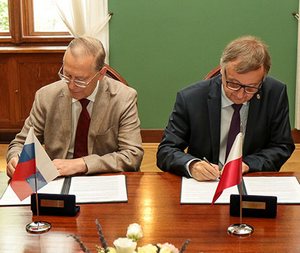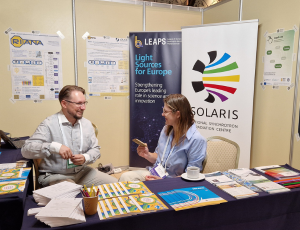 Web Content Display
Web Content Display
SOLARIS centre
 Web Content Display
Web Content Display
The agreement on constructing a beamline for structural studies signed

On 29 June 2018 a cooperation agreement between the Jagiellonian University and the Joint Institute for Nuclear Research (JINR) in Dubna, Russia was signed. The agreement envisages the construction and operation of a Laboratory for Structural Research into Macromolecules and New Materials at the SOLARIS National Synchrotron Radiation Centre.
This multi-million investment in SOLARIS is a response to the huge demand from the scientific community. Thus, the new beamline will make the SOLARIS scientific offer substantially more attractive to researchers.
The document was signed by the Rector of the Jagiellonian University Prof. Wojciech Nowak and the Director of the Joint Institute for Nuclear Research Prof. Victor Matveev. The participants of the ceremony included: the Director of the SOLARIS National Synchrotron Radiation Centre Prof. Marek Stankiewicz, SOLARIS Deputy Directors: dr Adriana Wawrzyniak and mgr Michał Młynarczyk, the Dean of JU Faculty of Physics, Astronomy and Applied Computer Science Prof. Ewa Gudowska-Nowak, JINR Vice-Director Prof. Michaił Itkis, the JINR Plenipotentiary Representative of the Government of RP Prof. Michael Waligórski, and the Leader of the Polish National Group at JINR dr Władysław Chmielowski.
The signing of the agreement finalised several months of efforts and talks between the SOLARIS Center and the Polish and Russian ministries of science. Above all, however, the success was the result of negotiations and multi-stage arrangements with a foreign partner, i.e. the Joint Institute for Nuclear Research. The Institute, which exists since 1956, gathers nearly 1,000 scientists from Europe and Asia. Scientific teams working in seven JINR laboratories conduct research in the field of high energy physics, nuclear physics and molecular physics. Separate departments deal with radiation and radiobiology research.
Under the agreement signed, a Laboratory for Structural Research into Macromolecules and New Materials will be created at the SOLARIS Centre. The base of the laboratory will be a high energy beamline for structural studies. A beamline with such parameters has been one of the most sought-after by the Polish scientific community for some time. Its end stations will enable basic and applied studies, such as:
- comprehensive studies on crystalline structures of various materials, including biological samples (proteins, protein complexes, nucleic acids, etc.), biological macromolecules in solutions, nanoparticles suspensions, new nanomaterials (polymer systems, molecular sieves, nanocomposites, liquid crystals, etc.),
- studies on crystal structure of functional materials under high pressure,
- studies on structural phase transitions under high pressure;
- studies on structure of unstructured objects (proteins, membrane and spherical proteins, macromolecular complexes, viruses and virus-like particles, biological membranes, nucleic acids and the their complexes with proteins and / or drug delivery systems).
The investment will cover the expansion of the SOLARIS Centre experimental hall. It will start as soon as all necessary permits are granted.



